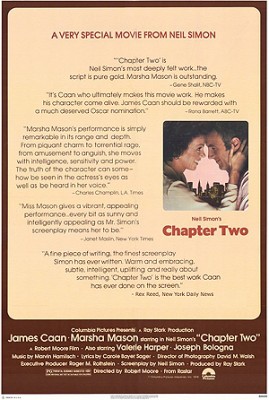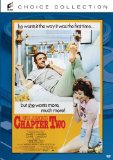| Reviews & Columns |
|
Reviews DVD TV on DVD Blu-ray 4K UHD International DVDs In Theaters Reviews by Studio Video Games Features Collector Series DVDs Easter Egg Database Interviews DVD Talk Radio Feature Articles Columns Anime Talk DVD Savant Horror DVDs The M.O.D. Squad Art House HD Talk Silent DVD
|
DVD Talk Forum |
|
|
| Resources |
|
DVD Price Search Customer Service #'s RCE Info Links |
|
Columns
|
|
|
(Neil Simon's) Chapter Two
The movie, produced and directed by filmmakers long associated with Neil Simon adaptations, is well written but doesn't quite elicit the kind of audience empathy and emotional involvement it seems to require. There are several possible reasons for this, including the casting of Caan in the lead.
A manufactured-on-demand title under Sony's "Choice Collection" label, Chapter Two is presented in 16:9 enhanced widescreen, and generally looks good. The region-free disc has no extras, and indeed no menu screens at all.
The plot is simple enough. Widower George Schneider (Caan) can't get over the recent death of his wife. (Recent and mysterious. The audience never learns how she died, or precisely when or where, nor do they learn much about her.) His press agent brother, Leo (Joseph Bologna) tries to console him, eventually setting him up on a disastrous series of blind dates. Meanwhile soap opera actress Jennie MacLaine (Marsha Mason) is coping slightly better with her recent divorce, aided by her best friend, glamorous Faye (Valerie Harper, post-Mary Tyler Moore weight loss and here looking overly bronzed and bony.)
George and Jennie have a series of meet-cute phone calls, with George initially mistaking her for someone else. They finally meet in the flesh a good 36 minutes into the picture, and scenes of their budding romance are sweet, funny, and emotionally realistic. However, in bed together George catches sight of his dead wife's portrait resting on the nightstand, and this sends him into a funk. Nevertheless, George and Jennie decide to get married, but his unresolved feelings threaten their happiness.
Chapter Two won a lot of praise when it was new (note the poster above) but today it seems awfully labored and even depressing without much insight. (Mild Spoilers) In the end, George's issues are abruptly resolved with about as much explanation as his first wife's death, i.e., practically none. Except early in his courtship with Jennie, George mopes about constantly, almost from beginning to end, and yet there's precious little working through his problems or even much discussion about it. Instead, most of the play/film seems concerned with Jennie's fruitless attempts to reach him.
The casting of James Caan in the co-lead hurts in strange, ironic ways. He'd been on TV going back to the early-1960s but his role as the hotheaded Sonny Corleone in The Godfather (1972) abruptly transformed him into one of the biggest stars of the '70s. It also typecast him in that mold. Even when he wasn't playing Italian-Americans (in movies like Rollerball, The Killer Elite, A Bridge Too Far) audiences tended to think of him in those terms - a wiseguy with temper - but in fact Caan's parents were Jewish immigrants from Germany.
Yet so engrained was his screen persona by this time, watching him here play not only an explicitly Jewish character but also a mild-mannered one whose depression turns him into jelly, and a surrogate for bookish Neil Simon to boot, is a jarring adjustment movie audiences had trouble making.
Further damaging this, at least for me, is an awareness that the role on Broadway was originated by Judd Hirsch (Taxi), an actor as ideally suited for this part as Caan is not. Indeed, Caan's line-delivery often even sounds like Hirsch. It's a second-best performance by a Hollywood star when a first-best performance by somebody less famous would have been better.
Mason, conversely, is excellent. Never one of this reviewer's favorite actresses, Mason here in a part written for, and in tribute of her plays to her strengths yet she's also reaching emotionally and succeeds beautifully.
Like other Simon adaptions the focus stays on the dialogue and performances, with minimal opening up and changes from the original play. Director Robert Moore, a veteran of Rhoda, had already helmed Simon's Murder by Death (1976), The Cheap Detective (1978), and a 1977 TV version of The Sunshine Boys (with Red Buttons and Lionel Stander) before this, while producer Ray Stark eventually filmed about a dozen Simon adaptations.
One last note: The musical score by Marvin Hamlish is another distracting curiosity. Its primary motif pretty directly quotes a score Hamlish penned just the year before, for the movie Same Time, Next Year (1978).
Video & Audio
Presented on a region-free DVD-R, Chapter Two has that alternately grainy/soft-focus look of a lot of late-'70s/early '80s movies, but otherwise looks just fine, while the English mono audio is clean and clear. No Extra Features. The show is preceded by a warning that piracy is not a victimless crime and a website where those that don't can read more about it.
Parting Thoughts
Chapter Two may very well have been the only Neil Simon movie this reviewer missed through the years, and while I'm glad to have finally caught up with it, I didn't miss much. The ambitious but overly angst-ridden screenplay and Caan's strange miscasting hurt it, while Mason's performance compensates in some ways. For Neil Simon fans, it's mildly Recommended.
Stuart Galbraith IV is a Kyoto-based film historian whose work includes film history books, DVD and Blu-ray audio commentaries and special features. Visit Stuart's Cine Blogarama here.
|
| Popular Reviews |
| Sponsored Links |
|
|
| Sponsored Links |
|
|
| Release List | Reviews | Shop | Newsletter | Forum | DVD Giveaways | Blu-Ray | Advertise |
|
Copyright 2024 DVDTalk.com All Rights Reserved. Legal Info, Privacy Policy, Terms of Use,
Manage Preferences,
Your Privacy Choices | |||||||
















